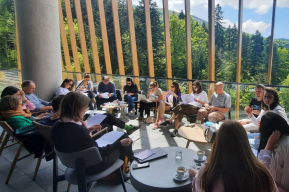Article
IPCSD | Culture for Climate Action

Rationale
The effects of climate change on cultural heritage are already being felt around the world, bearing increasing threats for the safeguarding of cultural sites and local practices. Meanwhile, culture provides a widely untapped reservoir of responses and solutions to both mitigate and adapt to climate change impacts. UNESCO’s designated sites, including World Heritage properties, Biosphere Reserves and Global Geoparks, allow to protect some 10 million square kilometers of cultural and natural sites around the world, thus contributing to global climate change mitigation action. Living heritage, in the form of local and indigenous knowledge, is a particularly vital source of resilience which provides adaptation strategies including through traditional food security mechanisms and water and land management techniques. While cities account for more than 75% of global greenhouse gas emissions, they also lead creative and innovative efforts to promote more sustainable production and consumption patterns, as well as by tapping into innovative approaches and materials building on creativity and design. Most of the 246 members of the UNESCO Creative Cities Network demonstrate how cities can adopt more sustainable practices for individual or collective action, reduce the carbon footprint of the cultural and creative industries, or spark debate about climate change in the urban context through a wide array of creative fields from literature and design, to gastronomy. Culture-based approaches can help shift the focus of climate negotiations from competing interests to shared values and the common good. As such, culture can have an impact on diverse policy areas related notably to urban planning, food security, social inclusion, and sustainable tourism.
Areas of focus
i) Local and Indigenous knowledge; ii) Sustainable tourism; iii) Disaster risk management; iv) Sustainable management of natural resources; (v) Sustainable consumption and production patterns; vi) Food security and sustainable agriculture; vii) Civil society-led action.
Expected outcomes
- Leverage culture and heritage to foster sustainable planning of cities and human settlements , and minimize climate-induced displacement by stimulating urban-rural linkages and fostering urban sustainability, including by promoting culture-informed low-carbon solutions in areas such as housing, planning or mobility;
- Foster capacity building and advocacy initiatives on local and indigenous knowledge to build more sustainable societies that respect the intrinsic linkages between cultural and biological diversity, notably by further including culture in climate science and policy fora related to food security, sustainable agriculture, water and land management, as well as by providing and supporting platforms for policy dialogue and knowledge sharing;
- Promote UNESCO designated sites as learning laboratories for climate adaptation and mitigation to test resilient management strategies and frameworks for disaster risk preparedness, with a view to integrate culture into local, national and regional strategies and policy mechanisms on climate action;
- Strengthen innovative partnerships, funding schemes and new technologies for research and innovation to build knowledge and evidence on the multifaceted linkages between culture in 5 all its forms – natural, tangible and intangible heritage, cultural and creative industries – and climate action;
- Support youth leadership and civil society organizations - including those initiated by womenled, refugee-led, on climate change through culture-based education, creativity and innovation – notably by involving artists, cultural and educational institutions – with a view to nurture knowledge, shift attitudes, values and behaviors to spark engagement and transformational change.








